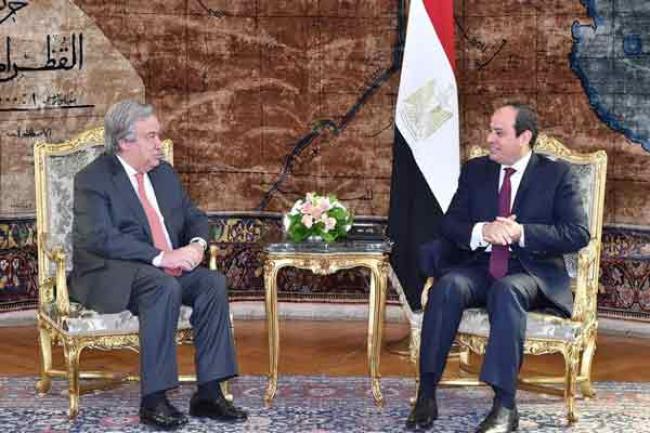Just Earth News 16 Feb 2017

Office of the Presidency of Egypt
Speaking to reporters in Cairo after meeting Egyptian President Abdel Fattah al-Sisi, the Secretary-General praised Egypt as a “central player” and an “absolutely essential contributor” to finding a solution to regional proble
He referred to the international talks on Syria held earlier this month in the Kazakh capital of Astana which resulted in an agreement on how to monitor the ceasefire effort started in December 2016.
“The Astana talks were an important contribution because they led to a ceasefire and we hope that the ceasefire will be maintained,” Guterres said, “but we consider that without a political solution, not only ceasefires cannot hold, but more than that the fight against terrorism will not be effective.”
“That is why we are so committed to make sure that the political process moves on and I hope that Geneva will be an important step in that direction,” he added in a press conference alongside the Minister of Foreign Affairs Sameh Shoukry.
Guterres also made reference to the Security Council, saying that it was “very important to recognize that the United Nations will be what Member States allow it to be.”
He stressed his personal commitment – echoing comments in Dubai days earlier – to reform the UN Secretariat and help to create “effective coordination and accountability” in the different UN bodies to strengthen the reputation of the United Nations at a global level.
During the press encounter, the Secretary-General also stated that there was “no Plan B” to the two-state solution between Israelis and Palestinians: “Everything must be done to preserve that possibility.”
He also noted the situations in Libya and Yemen, calling for effective reconciliation and reconstruction to aid the people and the stability of the region.
Turning to Syria, Guterres noted that he has consistently said that the countries of the region that have been receiving so many Syrian refugees, as well as those from Iraq and from many other crises, the countries of the region – Lebanon, Jordan, Turkey, Egypt – have not had enough support from the international community in general, from Europe in particular, both in relation to the refugees themselves and their living conditions and in relation to the host communities that share with them sometimes resources that are quite meagre.
Stressing that refugee protection is not only the responsibility of neighbours, but of the entire international community, The UN chief said it would be important to substantially increase the number of refugees that are resettled into Europe and other parts of the world in order to show effective solidarity with the countries of first asylum.
Role of youth in addressing on Wednesday’s challenges
Also on Wednesday, delivering a lecture at Cairo University, Guterres underlined the importance of young people in addressing the challenges confronting the contemporary world, including those to peace, impacts of climate change and growing inequalities.
“The best hope [to address these] challenges is with the new generations, we need to make sure that we are able to strongly invest in those new generations,” said the Secretary-General, urging the international community to be fully engaged in addressing a key problem of youth unemployment.
“The frustration generated in young people that have no hope in the future is a major source of insecurity in on Wednesday’s world. And it is essential that when Governments plan their economic activities, when the international community develops forms of cooperation, it is essential to put youth employment, youth skills [at] the centre of all priorities, [at] the centre of all projects,” he noted, adding:
“Unfortunately, this sometimes tends to be forgotten. And one way to avoid this to be forgotten is to bet strongly on the empowerment of young people.”